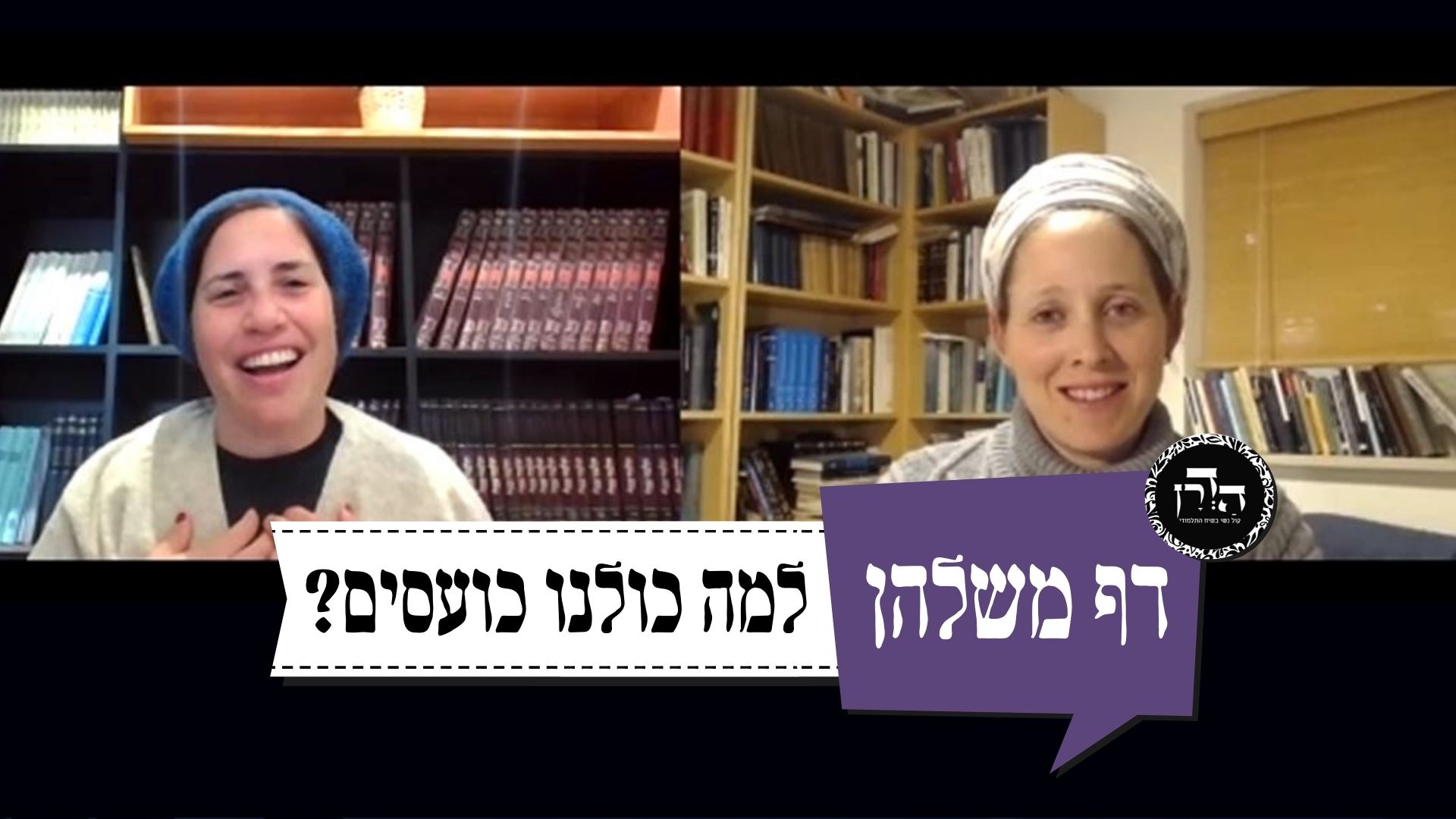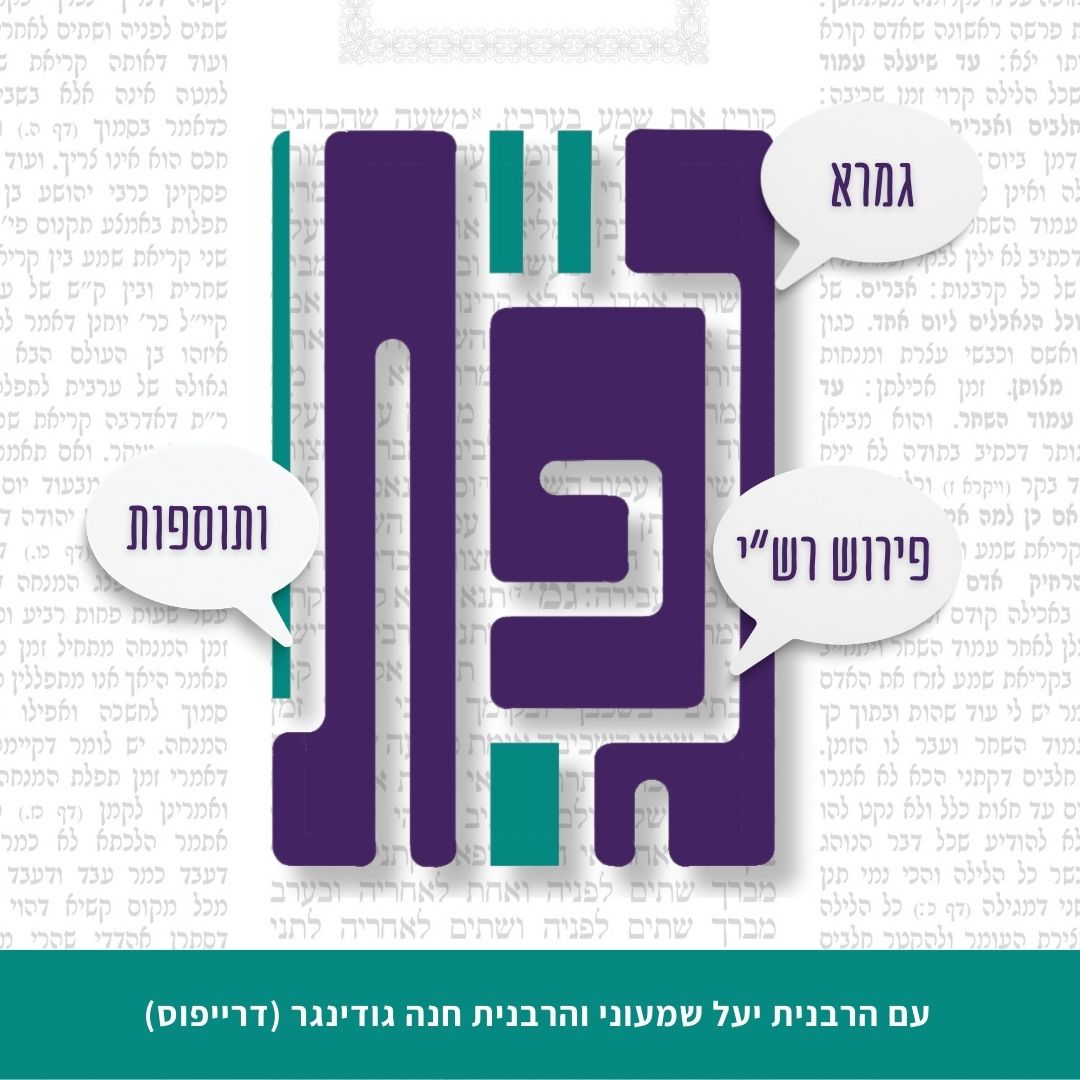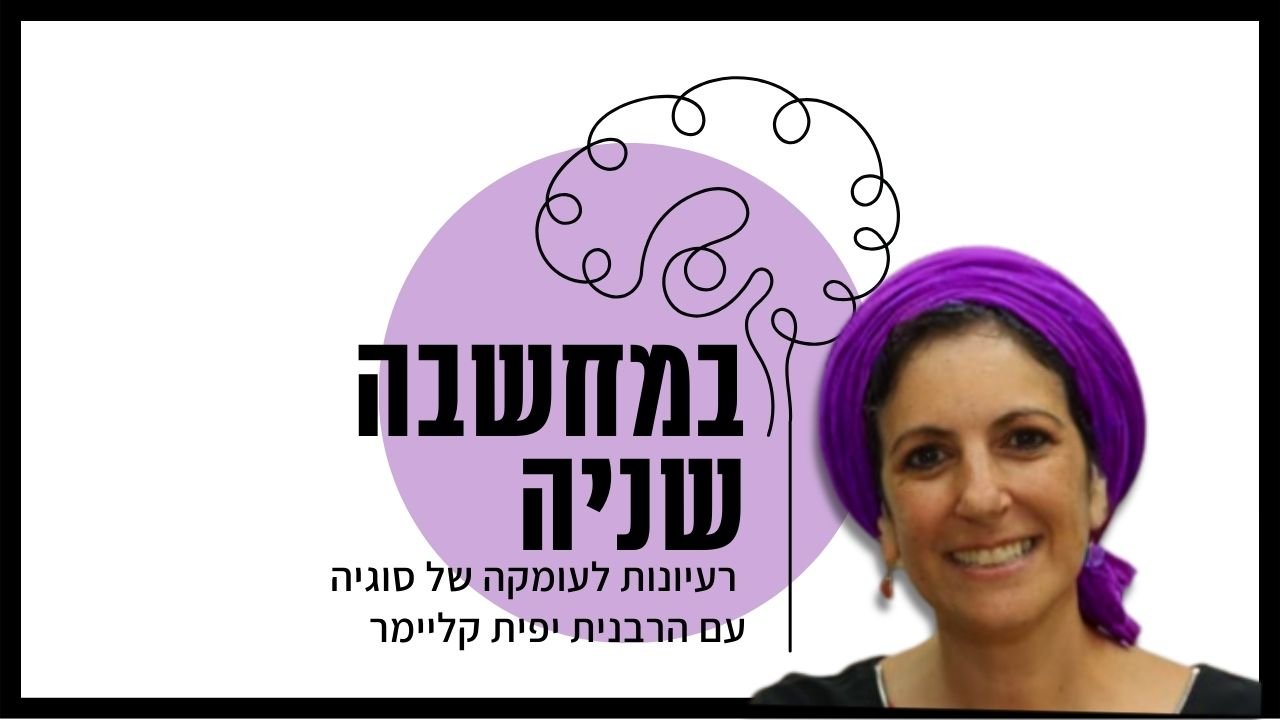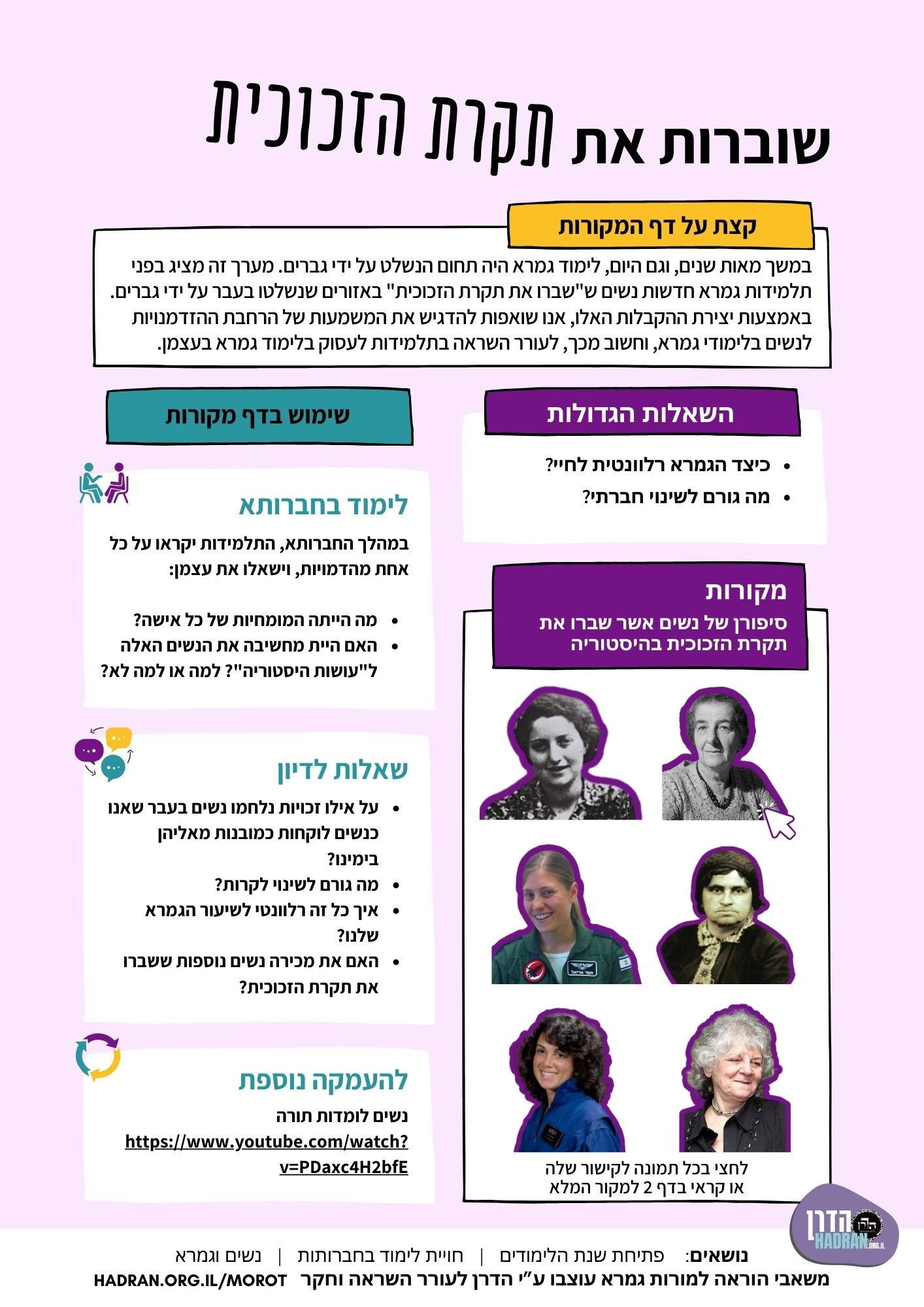האם לומדים ההבדלים בין נדה לזבה מהלכה למשה מסיני או מפסוקים? הברייתא מעלה כל מיני אפשרויות בכדי להבין איך יודעים מה כוונת התורה בימי נדה ובימי זבה ואיך יודעים האם דמים מסויימים נחשבים נדה או זבה?
רוצה להקדיש שיעור?
כלים
העמקה
רוצה להבין מה באמת קורה מתחת לפני השטח של הסוגיה?
שיעורים, פודקאסטים והרחבות של מיטב המורות שלנו יפתחו לך עוד זוויות וכיווני חשיבה.
חדשה בלימוד הגמרא?
זה הדף הראשון שלך? איזו התרגשות עצומה! יש לנו בדיוק את התכנים והכלים שיעזרו לך לעשות את הצעדים הראשונים ללמידה בקצב וברמה שלך, כך תוכלי להרגיש בנוח גם בתוך הסוגיות המורכבות ומאתגרות.
פסיפס הלומדות שלנו
גלי את קהילת הלומדות שלנו, מגוון נשים, רקעים וסיפורים. כולן חלק מתנועה ומסע מרגש ועוצמתי.
נדה עג
״בְּלֹא עֶת נִדָּתָהּ״ (עַל נִדָּתָהּ) — סָמוּךְ לְנִדָּתָהּ.
“And if a woman has a discharge of her ziva blood for many days not in the time of her menstruation, or if she has a discharge beyond the time of her menstruation, all the days of the issue of her ziva she shall be as in the days of her menstruation: She is impure” (Leviticus 15:25). This verse teaches that a woman becomes a zava only if she experiences bleeding close to her days of menstruation, i.e., on the day following her days of menstruation, but not during her days of menstruation.
וְאֵין לִי אֶלָּא סָמוּךְ לְנִדָּתָהּ, מוּפְלָג לְנִדָּתָהּ יוֹם אֶחָד מִנַּיִן? תַּלְמוּד לוֹמַר: ״אוֹ כִּי תָּזוּב״.
The baraita continues: And I have derived only that she is a zava in a case where she experiences bleeding close to her time of menstruation. From where do I derive that if she experiences bleeding one day separated from her days of menstruation she is also a zava? The verse states: “Or if she has a discharge beyond the time of her menstruation” (Leviticus 15:25).
אֵין לִי אֶלָּא יוֹם אֶחָד, מִנַּיִן לְרַבּוֹת מוּפְלָג שְׁנַיִם, שְׁלֹשָׁה, אַרְבָּעָה, חֲמִשָּׁה, שִׁשָּׁה, וְשִׁבְעָה, שְׁמוֹנָה, תִּשְׁעָה, עֲשָׂרָה, מִנַּיִן?
The baraita further states: I have derived only that she is a zava in a case where she experiences bleeding one day away from her time of menstruation. From where is it derived to include a case when she experiences bleeding two, three, four, five, six, seven, eight, nine, or ten days separated from her days of menstruation that she is also a zava? From where is this derived?
אָמַרְתָּ: מָה מָצִינוּ בִּרְבִיעִי שֶׁרָאוּי לִסְפִירָה וְרָאוּי לְזִיבָה, אַף אֲנִי אָבִיא הָעֲשִׂירִי שֶׁרָאוּי לִסְפִירָה וְרָאוּי לְזִיבָה.
You say as follows: Just as we find with regard to a woman who experiences bleeding on the fourth day of her days of ziva, that it is fit for counting, i.e., if she experiences bleeding for the first time on that day she must count one clean day for the one day that she experienced bleeding, and it is fit for ziva, i.e., if it is the last of three consecutive days of sightings that she becomes a greater zava, so too I will bring and include the tenth day, as it is fit for counting if she experiences bleeding for the first time on that day, and fit for ziva if she experiences bleeding for the third consecutive day on the tenth day.
וּמִנַּיִן לְרַבּוֹת אַחַד עָשָׂר? תַּלְמוּד לוֹמַר ״בְּלֹא עֶת נִדָּתָהּ״. יָכוֹל שֶׁאֲנִי מְרַבֶּה אַף שְׁנֵים עָשָׂר? אָמַרְתָּ: לָאו.
The baraita continues: And from where is it derived to include a case where she experiences bleeding on the eleventh day after her days of menstruation? The verse states: “Not in the time of her menstruation” (Leviticus 15:25). One might have thought that I include even the twelfth day after her period of menstruation. You must say: No, as that is no longer within her days of ziva.
וּמָה רָאִיתָ לְרַבּוֹת אַחַד עָשָׂר וּלְהוֹצִיא שְׁנֵים עָשָׂר? מְרַבֶּה אֲנִי אַחַד עָשָׂר — שֶׁרָאוּי לִסְפִירַת ״אוֹ כִי תָזוּב״, וּמוֹצִיא אֲנִי שְׁנֵים עָשָׂר — שֶׁאֵין רָאוּי לִסְפִירַת ״אוֹ כִי תָזוּב״.
The baraita further states: And what did you see to include the eleventh day and to exclude the twelfth day? I include the eleventh day as it is fit for counting the seven clean days that follow sightings on three consecutive days which ended on the fourth day, as derived from the verse: “Or if she has a discharge beyond the time of her menstruation” (Leviticus 15:25), as explained; and I exclude the twelfth day as it is not fit for counting the seven clean days after the fourth day, a requirement derived from the same verse: “Or if she has a discharge beyond the time of her menstruation.”
וְאֵין לִי אֶלָּא שְׁלֹשָׁה יָמִים, שְׁנֵי יָמִים מִנַּיִן? תַּלְמוּד לוֹמַר ״יְמֵי״, יוֹם אֶחָד מִנַּיִן? תַּלְמוּד לוֹמַר ״כׇּל יְמֵי״.
The baraita continues: And I have derived only that a woman is impure as a zava if she experiences bleeding for three consecutive days. From where do I derive that she is impure if she experiences bleeding for two consecutive days? The continuation of the verse states: “All the days of the issue of her ziva she shall be as in the days of her menstruation: She is impure” (Leviticus 15:25). The plural “days” indicates two days. From where is it derived that she is impure if she experiences bleeding on only one day? The verse states: “All the days of the issue of her ziva she shall be as in the days of her menstruation: She is impure.”
״טְמֵאָה״ — מְלַמֵּד שֶׁמְּטַמְּאָה אֶת בּוֹעֲלָהּ כְּנִדָּה. ״הִיא״ — הִיא מְטַמְּאָה אֶת בּוֹעֲלָהּ, וְאֵין הַזָּב מְטַמֵּא מָה שֶׁהוּא בּוֹעֵל.
The baraita further explains that the word “impure” in that verse teaches that a zava renders one who engages in intercourse with her impure, just like a menstruating woman does. The term: “She is impure,” indicates that she, a zava, renders a man who engages in intercourse with her impure, but a zav does not render a woman whom he engages in intercourse with ritually impure.
וַהֲלֹא דִּין הוּא, וּמָה הִיא שֶׁאֵינָהּ מְטַמְּאָה בִּרְאִיּוֹת כִּבְיָמִים — מְטַמְּאָה אֶת בּוֹעֲלָהּ, הוּא שֶׁמְּטַמֵּא בִּרְאִיּוֹת כִּבְיָמִים — אֵינוֹ דִּין שֶׁמְּטַמֵּא מַה שֶּׁהוּא בּוֹעֵל! תַּלְמוּד לוֹמַר: ״הִיא״ — הִיא מְטַמְּאָה אֶת בּוֹעֲלָהּ, וְאֵין הַזָּב מְטַמֵּא מַה שֶּׁהוּא בּוֹעֵל.
One might have thought that one who engages in intercourse with a zav has the same status as one who engages in intercourse with a zava. Could this not be derived through an a fortiori inference? And if a zava, who does not become impure through three sightings like she becomes impure if she experiences bleeding for three consecutive days, and yet she renders a man who engages in intercourse with her impure, then with regard to a zav, who becomes impure through three sightings even on a single day like he becomes impure by seeing a discharge for three consecutive days, isn’t it logical that he should render a women whom he engages in intercourse with ritually impure? Therefore, the verse states: “She shall be impure.” This teaches that a zava renders a man who engages in intercourse with her impure, but a zav does not render a woman whom he engages in intercourse with ritually impure.
וּמִנַּיִן שֶׁהוּא עוֹשֶׂה מִשְׁכָּב וּמוֹשָׁב? תַּלְמוּד לוֹמַר: ״כְּמִשְׁכַּב נִדָּתָהּ״.
And from where is it derived that a zava transmits impurity to items designated for lying or sitting? The verse states: “Every bed which she lies on all the days of her discharge shall be for her like the bed of her menstruation; and everything that she sits on shall be impure, as the impurity of her menstruation” (Leviticus 15:26).
וְאֵין לִי אֶלָּא שְׁלֹשָׁה יָמִים, שְׁנֵי יָמִים מִנַּיִן? תַּלְמוּד לוֹמַר ״יְמֵי״, יוֹם אֶחָד מִנַּיִן? תַּלְמוּד לוֹמַר: ״כׇּל יְמֵי״.
And I have derived only that she transmits impurity to items designated for lying or sitting if she experiences bleeding for three consecutive days and is a greater zava. From where do I derive that she transmits impurity to items designated for lying or sitting if she experiences bleeding for two consecutive days and is only a lesser zava? The verse states “days.” And from where do I derive that she transmits impurity to items designated for lying or sitting even if she experiences bleeding on only one day? The verse states: “All the days of her discharge.”
וּמִנַּיִן שֶׁסּוֹפֶרֶת אֶחָד לְאֶחָד? תַּלְמוּד לוֹמַר: ״יִהְיֶה לָהּ״. יָכוֹל תִּסְפּוֹר שִׁבְעָה לִשְׁנַיִם? וְדִין הוּא: וּמָה הוּא, שֶׁאֵין סוֹפֵר אֶחָד לְאֶחָד, סוֹפֵר שִׁבְעָה לִשְׁנַיִם — הִיא, שֶׁסּוֹפֶרֶת אֶחָד לְאֶחָד, אֵינוֹ דִּין שֶׁתִּסְפּוֹר שִׁבְעָה לִשְׁנַיִם? תַּלְמוּד לוֹמַר: ״יִהְיֶה לָהּ״ — אֵינָהּ סוֹפֶרֶת אֶלָּא יוֹמָהּ.
The baraita continues: And from where is it derived that she counts one clean day for experiencing bleeding on one day? The verse states: “All the days of her discharge shall be for her.” One might have thought that she must count seven clean days for experiencing bleeding on two consecutive days. And this is a logical inference: Just as a zav, who does not count one clean day if he sees a discharge on one day, nevertheless must count seven clean days if he sees a discharge on two days, then with regard to a zava, who counts one clean day if she experiences bleeding on one day, isn’t it logical that she should count seven clean days if she experiences bleeding on two consecutive days? The verse states: “All the days of her discharge shall be for her,” which teaches that she counts only her one day even if she experiences bleeding for two consecutive days.
אַלְמָא קְרָאֵי נִינְהוּ! לְרַבִּי עֲקִיבָא — קְרָאֵי, לְרַבִּי אֶלְעָזָר בֶּן עֲזַרְיָה — הִלְכְתָא.
The Gemara explains the difficulty from this baraita: Evidently, the halakhot of the eleven days of ziva are derived from verses and are not a halakha transmitted to Moses from Sinai. The Gemara answers: According to the opinion of Rabbi Akiva these halakhot are derived from verses. According to the opinion of Rabbi Elazar ben Azarya they are a halakha transmitted to Moses from Sinai.
אֲמַר לֵיהּ רַב שְׁמַעְיָה לְרַבִּי אַבָּא: אֵימָא, בִּימָמָא תִּהְוֵי זָבָה, בְּלֵילְיָא תִּהְוֵי נִדָּה! אֲמַר לֵיהּ: עֲלָךְ אָמַר קְרָא ״עַל נִדָּתָהּ״ — סָמוּךְ לְנִדָּתָהּ. סָמוּךְ לְנִדָּתָהּ אֵימַת הָוֵי? בְּלֵילְיָא, וְקָא קָרֵי לַהּ זָבָה.
With regard to the verse discussing the days of ziva, Rav Shemaya said to Rabbi Abba: But one can say that if she experiences bleeding during the daytime she shall be a zava, but if she experiences bleeding at night she shall be a menstruating woman, as the verse specifies “days.” Rabbi Abba said to him: With regard to your claim, the verse states: “Beyond the time of her menstruation” (Leviticus 15:25), which teaches that she becomes a zava if she experiences bleeding close to her days of menstruation. When is the time close to her days of menstruation? At night. And with regard to an emission during this time the verse calls her a zava.
תָּנָא דְּבֵי אֵלִיָּהוּ: כׇּל הַשּׁוֹנֶה הֲלָכוֹת בְּכׇל יוֹם, מוּבְטָח לוֹ שֶׁהוּא בֶּן הָעוֹלָם הַבָּא, שֶׁנֶּאֱמַר ״הֲלִיכוֹת עוֹלָם לוֹ״, אַל תִּקְרֵי ״הֲלִיכוֹת״ אֶלָּא הֲלָכוֹת.
The Gemara concludes the tractate with a general statement with regard to Torah study. The school of Elijah taught: Anyone who studies halakhot every day is guaranteed that he is destined for the World-to-Come, as it is stated: “His ways [halikhot] are eternal” (Habakkuk 3:6). Do not read the verse as halikhot; rather, read it as halakhot. The verse indicates that the study of halakhot brings one to eternal life in the future world.
הֲדַרַן עֲלָךְ תִּינוֹקֶת, וּסְלִיקָא לַהּ מַסֶּכֶת נִדָּה.




































